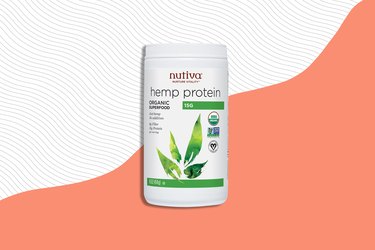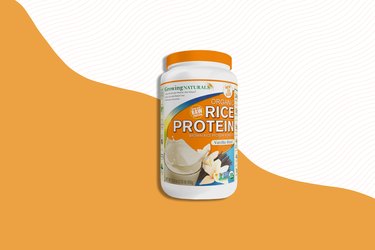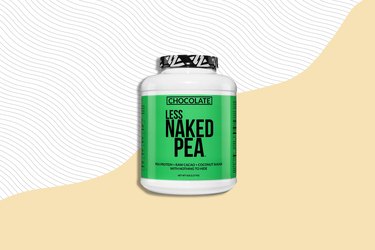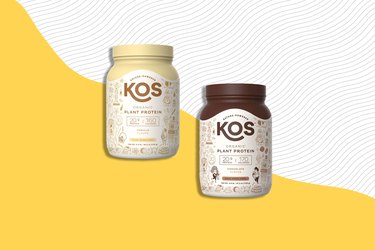
Plant-based protein powders aren't just for vegans looking to avoid all animal products. If you want to support your strength-training routine or just up your overall protein intake, these powders may be the trick to help you reach your goals.
When it comes to sparking your metabolism and building muscle, plant-based protein powders can be as beneficial as whey protein. And the risk of side effects, like digestive unrest, is actually pretty similar, too. Before you add this supplement to your daily routine, consider your current diet and whether protein powder is necessary to meet your nutrition needs.
Video of the Day
Video of the Day
Related Reading
What Is Plant-Based Protein Powder?
Unlike whey or collagen proteins (which are derived from animal products), plant-based protein powders, as they sound, come from plants. Instead of extracting the protein from milk, like with whey, plant protein comes from sources like peas, soy or hemp, according to the International Food Information Council Foundation.
Although you'll want to get a majority of your nutrients from whole foods, according to the Mayo Clinic, supplements, like protein powder, can be a convenient way to give your body a nutrition boost.
Protein needs vary from person to person, but the Recommended Dietary Allowance (RDA) for the macro for non-athletes is about 0.8 grams of protein per kilogram of body weight, according to Harvard Health Publishing. For a 150-pound person (equal to about 68 kilograms), that's roughly 54 grams of protein per day.
Before you go the supplement route, consider tracking the protein you eat; chances are, you're already getting plenty, Bonnie Taub-Dix, RDN, creator of BetterThanDieting.com, tells LIVESTRONG.com. But people following a vegetarian or vegan diet may need a little extra to meet their daily goal, as plants are less protein-dense than animal products.
If that's you, you can consider supplementing with plant-based protein powder. Talk to a doctor or dietitian about the adjustments you can make to your daily diet and whether or not supplementation is right for you, Taub-Dix says.
What Is Plant-Based Protein Powder Good For?
As plant-based diets have become more popular, the plant-based protein market has followed. Powders and other supplements can be helpful for people struggling to meet their RDA or who are looking to support muscle growth.
If increasing muscle mass is your goal, aim to eat between 1.2 to 1.7 grams of protein per kilogram of body weight, according to the American College of Sports Medicine (ACSM). For a 150-pound person, that's about 80 to 115 grams of protein a day, and plant-based protein powder can help you hit that target if you're not getting enough from your diet.
Plant-derived protein supplements can also be a good option for people who are lactose intolerant or generally struggle to digest dairy, Taub-Dix says. Whey, a popular form of protein powder, is derived from milk and can cause gas or bloating for those who don't handle dairy too well.
While the protein powder you choose (whether it's plant or animal) ultimately comes down to personal preference, according to Taub-Dix, there are some benefits behind getting more protein in general:
- Feeling fuller: Protein in food is filling and can help prevent weight gain, according to a June 2015 study in the American Journal of Clinical Nutrition. Although this doesn't mean you should load every meal with protein, introducing a bit more of the macro can help promote feelings of fullness. We still need more research to determine if protein in powder form is also filling, and the satisfaction factor might vary depending on the type of protein, according to a December 2011 study in Nutrition Journal.
- Improved bone health: The role of protein for bone health has long been debated, but recent research shows that increased protein intake (regardless of the source) can have a beneficial effect on bone density, according to the American Society for Nutrition.
- Increased muscle mass: Plant-based protein (and protein in general) can help increase or maintain muscle mass, according to an August 2019 study in Nutrients. Animal proteins are better at supporting muscle growth, however, because they tend to contain more essential amino acids than plant protein (but more on that below).
- Revved-up metabolism: Muscle burns more calories than fat, so increasing your protein intake, which can help build muscle, can in turn help spark your metabolism, according to the August 2019 Nutrients study. Researchers concluded that animal protein sources tend to be more effective.
How to Use Plant-Based Protein Powder Safely
Although plant-based protein powders haven't been extensively researched (as they really only boomed in recent years), they're generally safe if used properly, Taub-Dix says. The amount of protein you need will depend on how much you're already eating day-to-day.
How Much Protein Powder to Use
In general, stick to the recommended serving of protein powder listed on the container's label. Servings of both plant- and animal-based protein powder are usually 1 level scoop (the scoop comes in the container), for roughly 20 to 30 grams of protein and 80 to 120 calories total, according to Johns Hopkins Medicine.
There are still some side effects to consider. Sweeteners added to protein powders might upset some people's stomachs, especially if you take too much, Taub-Dix says, leading to bloating, gas or diarrhea, according to the Mayo Clinic.
As with other supplements, plant-based protein powders aren't regulated by the U.S. Food and Drug Administration (FDA) as strictly as prescription or over-the-counter medications. Protein powder labels can be misleading or exaggerate their claims with little penalty for the company, according to the FDA.
Tip
When you're shopping for a safe plant-based protein powder, opt for a variety that's third-party certified. Organizations like NSF International test supplements to ensure their ingredients actually match the labels on their packaging and verify that they don't contain unsafe levels of contaminants or any substances banned by major athletic organizations. Look for the NSF seal on supplement packaging or do a little online research to see if a brand is third-party certified.
Types of Plant-Based Protein Powders
Not all plant-based protein supplements are complete proteins, meaning they don't all contain the nine essential amino acids. Essential amino acids are building blocks of protein that your body can't create itself, so you have to get them through food
The essential amino acids are crucial for helping your body grow, break down food and repair tissue, according to the U.S. National Library of Medicine. If you're not getting complete proteins from natural sources (like dairy, eggs and meat), you should choose a plant-based powder that is a complete protein (like one made from soy or peas).
You should also pay close attention to the ingredient list, Taub-Dix says. Many protein powders include artificial sweeteners, flavorings, thickeners and additional vitamins you may not need. Try to choose a protein with as few ingredients as possible, she says.
Just as with animal-derived protein powders, there are plenty of plant-based types on the market. Most provide similar benefits with slight differences in taste. You can choose from any of these options:
- Pea protein is among the most popular forms of plant protein, according to Taub-Dix. Derived from pea plants, pea protein isn't a complete protein, but it may have comparable muscle-building effects to whey, according to a January 2015 study in the Journal of the International Society of Sports Nutrition.
- Hemp protein is a source of complete protein, according to a January 2019 study published in Food Research International, made from ground hemp seeds.
- Rice protein is an inexpensive source of plant protein made from rice that, like pea protein, has been shown to promote muscle growth much like whey protein, at least in high doses, according to a small June 2013 study in Nutrition Journal.
- Soy protein is a source of complete protein made from soybeans that provides all nine essential amino acids, according to the Harvard T.H. Chan School of Public Health.
- Pumpkin seed protein is one of the less common plant-based protein options out there, as it's low in amino acids like threonine and lysine, according to an August 2013 study in Agricultural and Food Chemistry.
- Sunflower seed protein is low in the essential amino acid lysine but can be a good source of glutamine, which may help prevent muscle loss, according to a November 2018 study in Nutrients.
- Sacha inchi protein is derived from a nut that's produced in the Peruvian Amazon and is recognized for lowering lipid levels, according to a February 2017 article in Toxicology Mechanisms and Methods.
- Chia protein comes from chia seeds, which are rich in healthy omega-3 fatty acids, according to the Harvard T.H. Chan School of Public Health.
- Plant-protein blends typically contain a blend of three or more plant-based protein powders.
Is Plant Protein as Good as Whey?
Both whey and plant-based protein powders have been shown to support muscle strength and size. After comparing the effects of whey and pea protein, for example, researchers found no significant differences between the two supplements, according to a January 2015 study in the Journal of the International Society of Sports Nutrition.
Plant-Based Protein Powder Brands to Buy
As you're shopping for a plant-based protein powder, keep an eye on the ingredients label, Taub-Dix says. Look for short lists with few artificial sweeteners (to limit your chances of bloating or gas), thickeners or fillers (like coconut flour, psyllium, cornstarch or xanthan gum).
Here are a few Amazon bestsellers with plenty of protein and minimal ingredients. Mix them up into a shake or use them in these creative protein powder recipes.
1. Nutiva Hemp Protein Powder
Nutiva's hemp protein provides 8 grams of fiber and 15 grams of protein per serving. With more than 2,500 positive reviews on Amazon, the product also features a minimal ingredient list with no additives or preservatives.
Buy it: Amazon.com; Price: $17.47
2. Revly Organic Plant-based Protein Powder
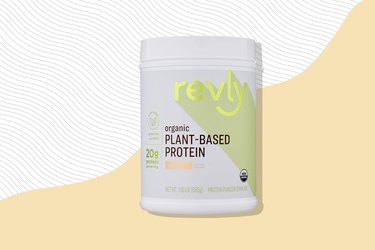
Made with a blend of pea and rice proteins, this pick gives you all the essential amino acids you need to build and maintain muscle. The organic protein powder comes in both Chocolate and Vanilla.
Buy it: Amazon.com; Price: $27.99
3. Growing Naturals Organic Rice Protein Powder
Growing Naturals rice protein powder is free of gluten, soy and dairy. The powder packs about 24 grams of protein per one-scoop serving.
Buy it: Amazon.com; Price: $46.42
4. Naked Nutrition Less Naked Pea Protein
Known for its short ingredients lists, Naked Nutrition offers a filler-free and artificial sweetener-free pea protein, formulated with just yellow pea protein for the unflavored version.
Buy it: NakedNutrition.com; Price: $57.99
5. Kos Organic Plant-Based Protein Powder
Kos Organic's plant protein blend is formulated with pea protein, flaxseed, quinoa, pumpkin seed and chia seed. The blend is sweetened with only a little stevia and monk fruit, making it free of artificial sweeteners or sugar alcohols.
Buy it: Amazon.com; Price: $43.88
- Mayo Clinic: "Supplements: Nutrition in a Pill?"
- Harvard Health Publishing: "How Much Protein Do You Need Every Day?"
- International Food Information Council Foundation: "A Primer on Protein Powders"
- ACSM: "Protein Intake for Optimal Muscle Maintenance"
- Journal of Nutrition Education and Behavior: "Perceived Importance of Dietary Protein to Prevent Weight Gain: A National Survey among Midlife Women"
- Nutrients: "The Role of the Anabolic Properties of Plant- versus Animal-Based Protein Sources in Supporting Muscle Mass Maintenance: A Critical Review"
- American Society for Nutrition: "Protein’s Role in Bone Health: Does Protein Type and Amount Matter?"
- Johns Hopkins Medicine: "Suggested Protein Supplements"
- Mayo Clinic: "Artificial Sweeteners and Other Sugar Substitutes"
- ISRN Nutrition: "Adverse Effects Associated with Protein Intake above the Recommended Dietary Allowance for Adults"
- American Kidney Fund: "There are Four Main Types of Kidney Stones"
- FDA: "Caution: Bodybuilding Products Can Be Risky"
- Journal of the International Society of Sports Nutrition: "Pea Proteins Oral Supplementation Promotes Muscle Thickness Gains During Resistance Training: a Double-Blind, Randomized, Placebo-Controlled Clinical Trial vs. Whey Protein."
- Food Research International: "Production, Digestibility and Allergenicity of Hemp (Cannabis sativa L.) Protein Isolates"
- Harvard T.H. Chan School of Public Health: "Straight Talk About Soy"
- Agricultural and Food Chemistry: "Pumpkin (Cucurbita maxima) Seed Proteins: Sequential Extraction Processing and Fraction Characterization"
- Nutrients: "Glutamine: Metabolism and Immune Function, Supplementation and Clinical Translation"
- Toxicology Mechanisms and Methods: "Nitrogen Balance After a Single Oral Consumption of Sacha Inchi (Plukenetia volúbilis L) Protein Compared to Soy Protein. A Randomized Study in Humans"
- Harvard T.H. Chan School of Public Health: "Chia Seeds"
- American Journal of Clinical Nutrition: "The Role of Protein in Weight Loss and Maintenance."
- Nutrition Journal: "Effect of Different Protein Sources on Satiation and Short-Term Satiety When Consumed as a Starter"
- Nutrition Journal: "The Effects of 8 Weeks of Whey or Rice Protein Supplementation on Body Composition and Exercise Performance"
- U.S. National Library of Medicine: "Amino acids"
